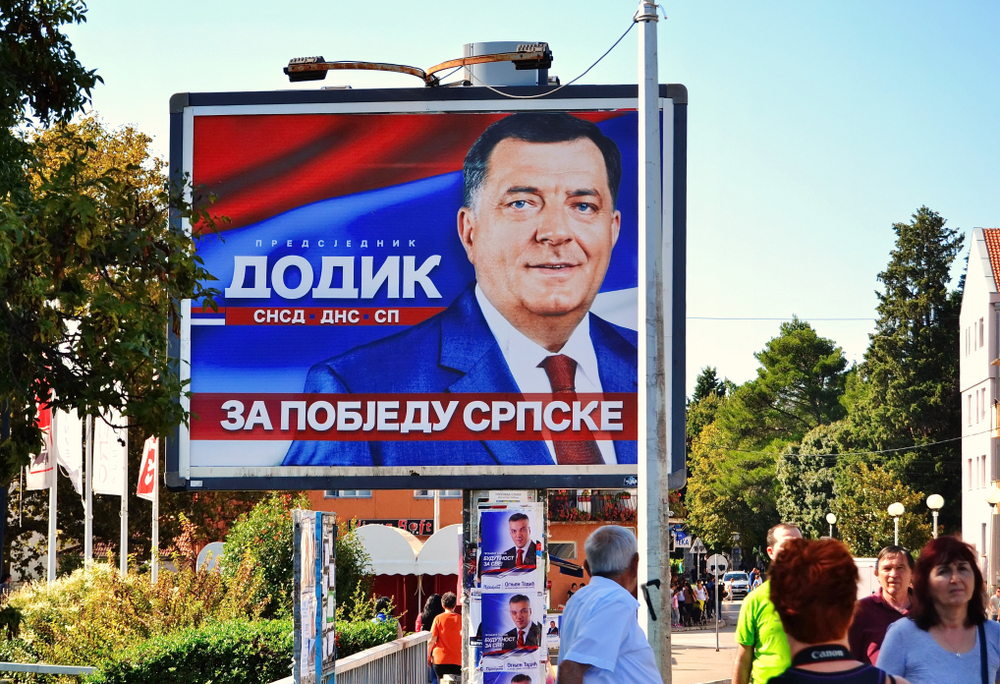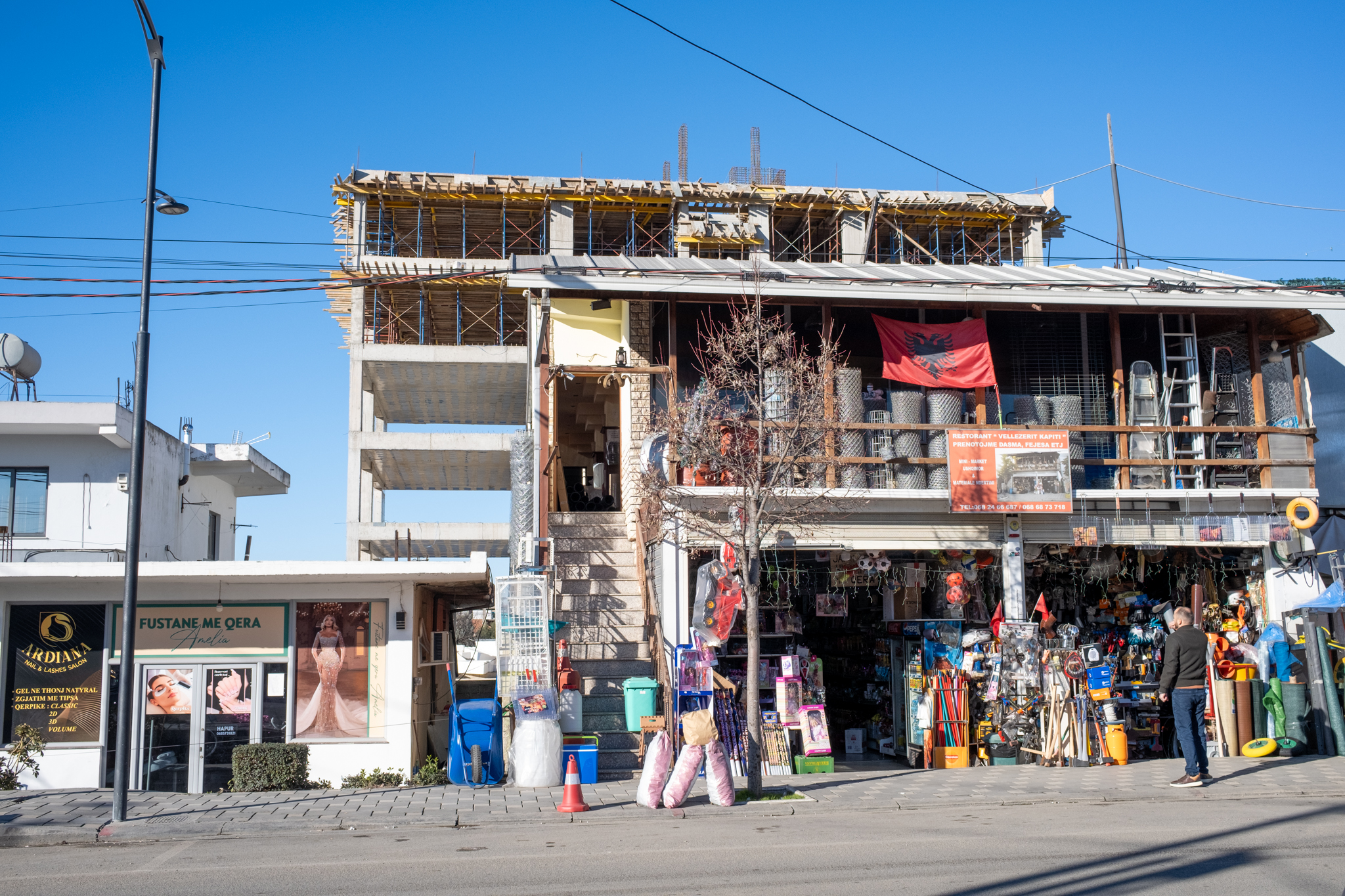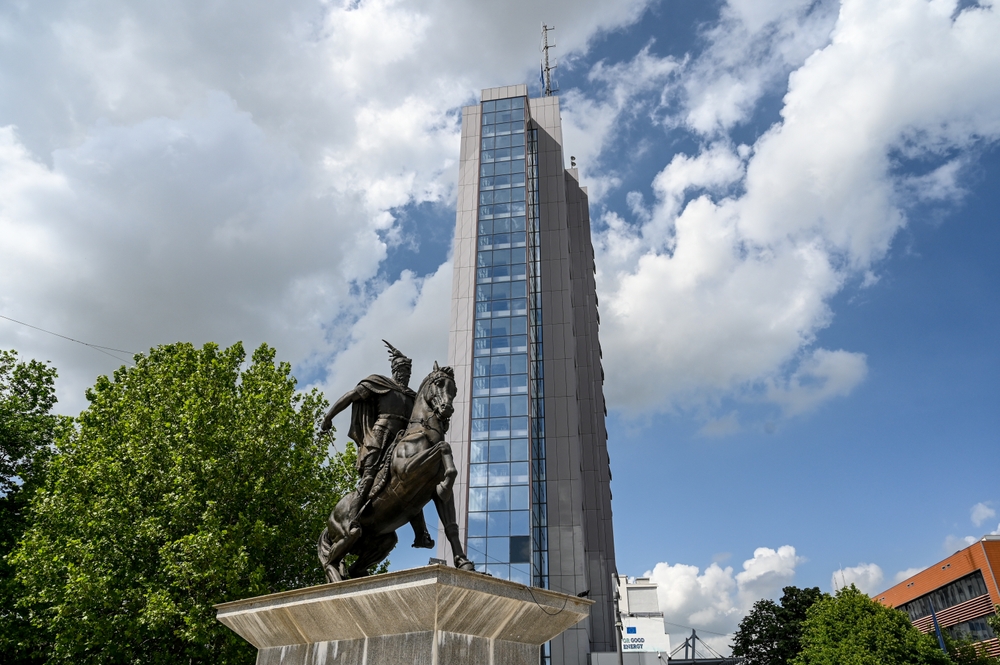Bosnia and Herzegovina and the EU, Dodik is working against the integration process
Republika Srpska President Milorad Dodik once again attacks the EU, accusing it of applying double standards to Bosnia and Herzegovina on the integration path. But Dodik’s own initiatives, which limit freedom of association and expression, are distancing the country from the European Union

Bosnia-and-Herzegovina-and-the-EU-Dodik-is-working-against-the-integration-process
Milorad Dodik - © SariMe/Shutterstock
“There will be no opening of EU accession negotiations for Bosnia and Herzegovina. As far as I understand from Brussels, the potential start of negotiations is fake news. The EU will try to promote negotiations with Ukraine, which does not even have full control of its territory, or many other things that Bosnia has. The EU will meet [Kyiv] while they keep us on a leash. They continue to think that Bosnia is worth less”.
These were the words of Milorad Dodik at the end of the meeting in Sarajevo with the other political leaders of the country. The meeting, which ended fruitlessly, was aimed at finding an agreement regarding the law on courts.
Dodik’s words are aimed at his electorate and are a new pretext to launch an invective against High Representative Schmidt. At the same time, however, they provide a clear example of the rhetoric used by the Bosnian Serb leader towards the European integration process. Dodik not too subtly accuses the European Union of adopting double standards and preferring Ukraine to Bosnia and Herzegovina and complains of differential treatment for Bosnia which, according to him, has many more requisites than Ukraine to aspire to the opening of negotiations of membership.
The priorities of the European Union for Bosnia
While Dodik seems to express frustration at the lack of recognition of Bosnia and Herzegovina’s progress, in fact, Dodik himself not only refuses the compromises necessary to advance the accession process, but is actively engaged in dismantling the progress achieved so far.
A clear example is the issue of freedom of expression and association. In the context of the accession process, in 2019, Bosnia and Herzegovina was required to substantially improve its legislative and institutional framework to ensure that the country meets 14 key priorities.
Freedom of the media is priority number twelve on this list: Bosnia and Herzegovina must guarantee freedom of expression, freedom of the media and the protection of journalists. Specifically, the country is tasked with continuing to prosecute cases of intimidation and violence against journalists and media workers and ensuring the financial sustainability of the public broadcasting system.
In 2022, the EU report on Bosnia and Herzegovina noted that the country had made no progress on freedom of expression. Among various aspects relating to freedom of expression, the report noted that, although defamation had been decriminalised as early as 2002, politicians and public officials continued to intimidate journalists through widespread use of lawsuits, which ultimately led to journalists to self-censor, in order to avoid time-consuming and costly court cases.
A similar analysis must be made for freedoms of association and assembly, which are priority number eleven, regarding which Bosnia and Herzegovina must guarantee a favourable environment for civil society and respect European standards.
The same EU report on Bosnia on such freedoms noted that laws on freedoms of assembly still needed to be harmonised and that while freedom of association continues to be generally respected, human rights defenders dealing with sensitive issues (such as LGBT+ people, corruption, migrants, women’s rights and the environment) continue to be the subject of threats, intimidation and violence and the authorities have so far been careful not to condemn these episodes.
In this sense, the report reiterates the obligation to ensure a favourable environment for civil society and in particular to consult the sector when adopting new laws on freedom of association.
Dodik’s ax on freedoms of association and expression
It is precisely on freedoms of association and expression that over the last few months Republika Srpska has implemented a series of particularly restrictive measures.
Dodik’s crackdown consists of a package of three laws that progressively restrict the space for freedom of expression for free, independent journalism. According to local observers, the reason why the leadership of Republika Srpska adopted them is the uncertain 2022 electoral result of Dodik’s party (SNSD) and the attempt to block any dissenting voice in view of the 2024 local elections.
The laws are: the law criminalising defamation again, the foreign agents law and finally the media law in Republika Srpska.
The law on the criminalisation of defamation has already been approved and provides for sanctions of up to 3,000 Euros for those who violate it, all of which is made even more difficult by the fact that the judicial power enjoys little independence from the political power.
The second law is modelled after foreign agent laws in place in countries such as Russia. Under this law, non-governmental organisations will have to register in a special register if they receive funds from abroad and clearly distinguish all their work with a specific logo. The result of this measure will most likely be a further stigmatisation of the reports produced by civil society organisations and further bureaucratic requirements to be fulfilled. Taking into account that the majority of NGOs operating in Bosnia are financed through projects and donations from embassies and international institutions, it is easy to understand the impact of this law. The law was approved in the first reading by the National Assembly of the RS and the second reading is awaited.
The third is the law on the media, for which at the moment the working group has not yet been officially created, while in fact this group exists and is working in a less than transparent way as recently ascertained by the Media Freedom Rapid Response mission. The little information received so far suggests that the law would effectively restrict the ability of media outlets to register as NGOs.
Expert organisations such as the Venice Commission and the ODIHR have spoken out publicly criticising the Criminalization of Defamation Law and the Foreign Agents Law. Such criticism, however, achieved very limited results, as the RS government simply softened the content of the defamation law. The adoption of the defamation law provoked joint criticism from the United Nations, the OSCE, the Council of Europe and the Delegation of the European Union in Bosnia and Herzegovina.
Less freedom for the residents of the RS, but not only
The result of Dodik’s laws is that residents of Republika Srpska are now less free than they were a year ago. Freedom of expression is therefore further limited and the favourable environment for civil society is far from being guaranteed by the authorities of Republika Srpska. Not only residents of the RS would be affected, but, most likely, also those of the Federation if their publications also circulated in Republika Srpska. The laws therefore further promote legislative uncertainty which can easily lead to further forms of self-censorship in RS.
It remains to be seen how the European Union will react, as the publication of the 2023 report on Bosnia and Herzegovina is expected within days. The adoption of these laws has effectively reduced the freedoms of the citizens of Bosnia and Herzegovina, which is exactly the opposite of what was required of the country. Will the EU report on Bosnia take this into account? And how will this decrease in freedom affect the possible opening of negotiations for joining the EU? The answer in days.
| This publication was produced within the Media Freedom Rapid Response (MFRR), co-funded by the European Commission. The contents of this publication are the sole responsibility of Osservatorio Balcani Caucaso Transeuropa and its partners and can in no way be taken to reflect the views of the European Union. |
Bosnia and Herzegovina and the EU, Dodik is working against the integration process
Republika Srpska President Milorad Dodik once again attacks the EU, accusing it of applying double standards to Bosnia and Herzegovina on the integration path. But Dodik’s own initiatives, which limit freedom of association and expression, are distancing the country from the European Union

Bosnia-and-Herzegovina-and-the-EU-Dodik-is-working-against-the-integration-process
Milorad Dodik - © SariMe/Shutterstock
“There will be no opening of EU accession negotiations for Bosnia and Herzegovina. As far as I understand from Brussels, the potential start of negotiations is fake news. The EU will try to promote negotiations with Ukraine, which does not even have full control of its territory, or many other things that Bosnia has. The EU will meet [Kyiv] while they keep us on a leash. They continue to think that Bosnia is worth less”.
These were the words of Milorad Dodik at the end of the meeting in Sarajevo with the other political leaders of the country. The meeting, which ended fruitlessly, was aimed at finding an agreement regarding the law on courts.
Dodik’s words are aimed at his electorate and are a new pretext to launch an invective against High Representative Schmidt. At the same time, however, they provide a clear example of the rhetoric used by the Bosnian Serb leader towards the European integration process. Dodik not too subtly accuses the European Union of adopting double standards and preferring Ukraine to Bosnia and Herzegovina and complains of differential treatment for Bosnia which, according to him, has many more requisites than Ukraine to aspire to the opening of negotiations of membership.
The priorities of the European Union for Bosnia
While Dodik seems to express frustration at the lack of recognition of Bosnia and Herzegovina’s progress, in fact, Dodik himself not only refuses the compromises necessary to advance the accession process, but is actively engaged in dismantling the progress achieved so far.
A clear example is the issue of freedom of expression and association. In the context of the accession process, in 2019, Bosnia and Herzegovina was required to substantially improve its legislative and institutional framework to ensure that the country meets 14 key priorities.
Freedom of the media is priority number twelve on this list: Bosnia and Herzegovina must guarantee freedom of expression, freedom of the media and the protection of journalists. Specifically, the country is tasked with continuing to prosecute cases of intimidation and violence against journalists and media workers and ensuring the financial sustainability of the public broadcasting system.
In 2022, the EU report on Bosnia and Herzegovina noted that the country had made no progress on freedom of expression. Among various aspects relating to freedom of expression, the report noted that, although defamation had been decriminalised as early as 2002, politicians and public officials continued to intimidate journalists through widespread use of lawsuits, which ultimately led to journalists to self-censor, in order to avoid time-consuming and costly court cases.
A similar analysis must be made for freedoms of association and assembly, which are priority number eleven, regarding which Bosnia and Herzegovina must guarantee a favourable environment for civil society and respect European standards.
The same EU report on Bosnia on such freedoms noted that laws on freedoms of assembly still needed to be harmonised and that while freedom of association continues to be generally respected, human rights defenders dealing with sensitive issues (such as LGBT+ people, corruption, migrants, women’s rights and the environment) continue to be the subject of threats, intimidation and violence and the authorities have so far been careful not to condemn these episodes.
In this sense, the report reiterates the obligation to ensure a favourable environment for civil society and in particular to consult the sector when adopting new laws on freedom of association.
Dodik’s ax on freedoms of association and expression
It is precisely on freedoms of association and expression that over the last few months Republika Srpska has implemented a series of particularly restrictive measures.
Dodik’s crackdown consists of a package of three laws that progressively restrict the space for freedom of expression for free, independent journalism. According to local observers, the reason why the leadership of Republika Srpska adopted them is the uncertain 2022 electoral result of Dodik’s party (SNSD) and the attempt to block any dissenting voice in view of the 2024 local elections.
The laws are: the law criminalising defamation again, the foreign agents law and finally the media law in Republika Srpska.
The law on the criminalisation of defamation has already been approved and provides for sanctions of up to 3,000 Euros for those who violate it, all of which is made even more difficult by the fact that the judicial power enjoys little independence from the political power.
The second law is modelled after foreign agent laws in place in countries such as Russia. Under this law, non-governmental organisations will have to register in a special register if they receive funds from abroad and clearly distinguish all their work with a specific logo. The result of this measure will most likely be a further stigmatisation of the reports produced by civil society organisations and further bureaucratic requirements to be fulfilled. Taking into account that the majority of NGOs operating in Bosnia are financed through projects and donations from embassies and international institutions, it is easy to understand the impact of this law. The law was approved in the first reading by the National Assembly of the RS and the second reading is awaited.
The third is the law on the media, for which at the moment the working group has not yet been officially created, while in fact this group exists and is working in a less than transparent way as recently ascertained by the Media Freedom Rapid Response mission. The little information received so far suggests that the law would effectively restrict the ability of media outlets to register as NGOs.
Expert organisations such as the Venice Commission and the ODIHR have spoken out publicly criticising the Criminalization of Defamation Law and the Foreign Agents Law. Such criticism, however, achieved very limited results, as the RS government simply softened the content of the defamation law. The adoption of the defamation law provoked joint criticism from the United Nations, the OSCE, the Council of Europe and the Delegation of the European Union in Bosnia and Herzegovina.
Less freedom for the residents of the RS, but not only
The result of Dodik’s laws is that residents of Republika Srpska are now less free than they were a year ago. Freedom of expression is therefore further limited and the favourable environment for civil society is far from being guaranteed by the authorities of Republika Srpska. Not only residents of the RS would be affected, but, most likely, also those of the Federation if their publications also circulated in Republika Srpska. The laws therefore further promote legislative uncertainty which can easily lead to further forms of self-censorship in RS.
It remains to be seen how the European Union will react, as the publication of the 2023 report on Bosnia and Herzegovina is expected within days. The adoption of these laws has effectively reduced the freedoms of the citizens of Bosnia and Herzegovina, which is exactly the opposite of what was required of the country. Will the EU report on Bosnia take this into account? And how will this decrease in freedom affect the possible opening of negotiations for joining the EU? The answer in days.
| This publication was produced within the Media Freedom Rapid Response (MFRR), co-funded by the European Commission. The contents of this publication are the sole responsibility of Osservatorio Balcani Caucaso Transeuropa and its partners and can in no way be taken to reflect the views of the European Union. |











